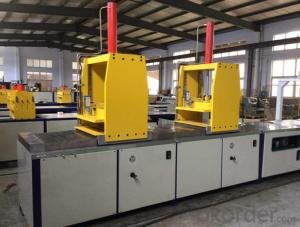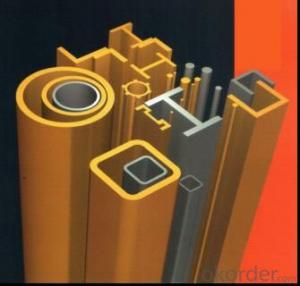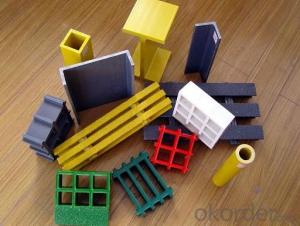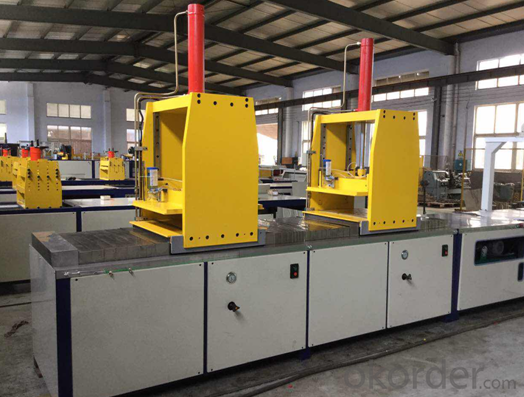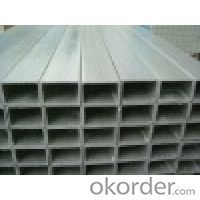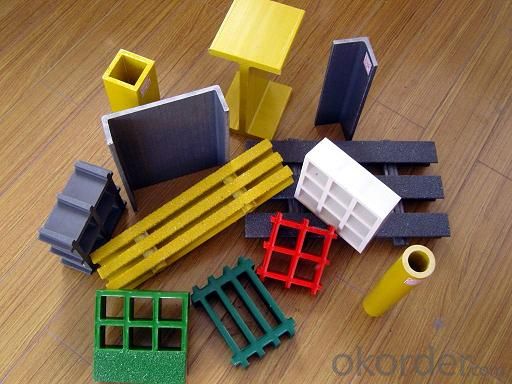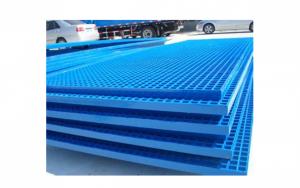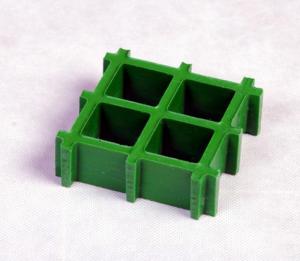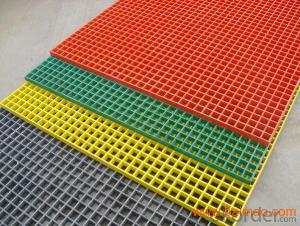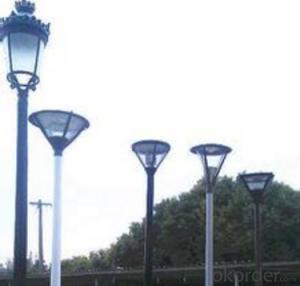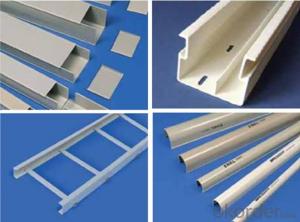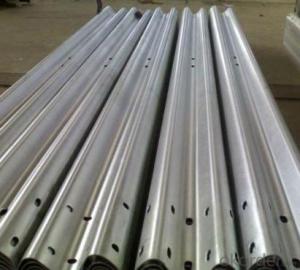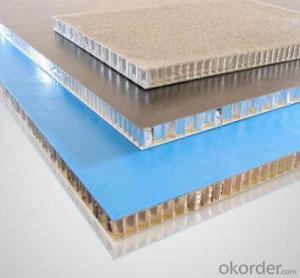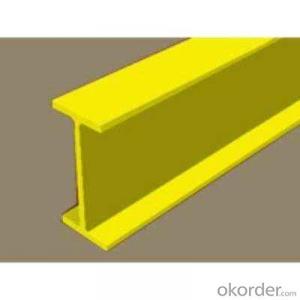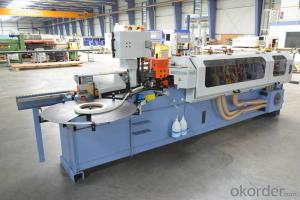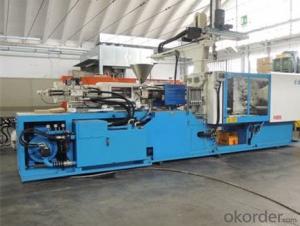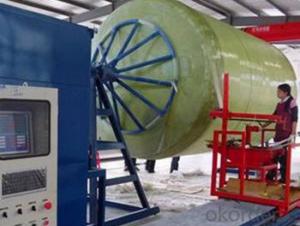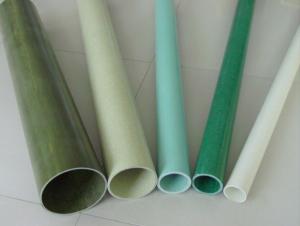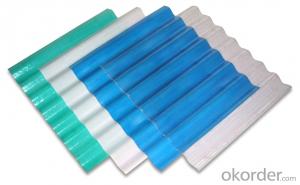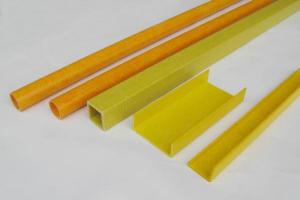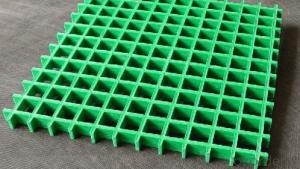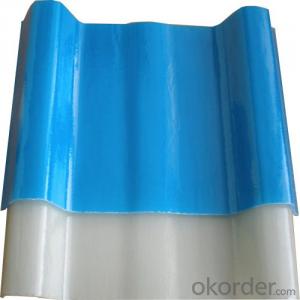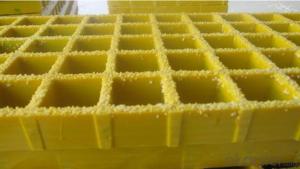FRP Pultrusion Profiles - Anti-Ageing FRP Pultruded Grating with Best Quality
- Loading Port:
- Tianjin
- Payment Terms:
- TT OR LC
- Min Order Qty:
- 4000 m.t.
- Supply Capability:
- 50000 m.t./month
OKorder Service Pledge
OKorder Financial Service
You Might Also Like
Specification
PRODUCT DESCRIPTION
Pultruded grating is made by a particular assembly process, which using “I” shape as its main load-bearing and special rod to go through the bearing bar. Pultruded grating include the standard grating and the custom grating, the custom grating can be designed to meet customer’s requirement or special using condition by changing the shape, size and space of the bearing bars, the surface can be covered with lozenge panel, grit panel, or added the anti-slippery sand directly.
FRP pultruded grating has the most characteristics of molded grating, but it has its distinct advantages, it has very high fiberglass content in the loading direction, so it has very high load capability, it has more superiority when used at wide span, so that the basic support will be decreased and the project cost will be reduced accordingly.
SPECIFICATION
Thickness (mm) | Bar width (mm) | Open space (mm) | Open rate (%) | Approx weight (kg/m |
25.4 | 15.2 | 22.8 | 60 | 13.2 |
25.4 | 15.2 | 15.2 | 50 | 15.9 |
25.4 | 15.2 | 10.1 | 40 | 18.5 |
25.4 | 40 | 10.8 | 21 | 14.5 |
38.1 | 15.2 | 22.8 | 60 | 15.8 |
38.1 | 15.2 | 15.2 | 50 | 19.1 |
38.1 | 15.2 | 10.1 | 40 | 22.4 |
50.8 | 25.4 | 25.4 | 50 | 16.6 |
50.8 | 25.4 | 12.7 | 33 | 21.1 |
CHOICE FOR PULTRUDED GRATING
Resin: GP resin, ISO resin, VE resin, Phenol resin
Color choice: Yellow, gray, green, custom color
Surface choice: Groove surface, grit surface, lozenge cover surface
FEATURES
a. Anti-corrosion and anti-rust
b. Light weight and high strength
c. Anti-flammable
d. Anti- fatigue
e. Safe and anti-slippery
f. Anti-ageing
g. Easy of maintenance
FIELDS SERVED
Sewage treatment,
water supply and drainage,
chemical industry,
oil industry,
power engineering,
pulp and paper,
construction engineering,
spinning, marine engineering.
APPLICATION
Operation terrace,
stair walkway,
ground floor,
trench cover,
sidewalk,
foot bridge,
equipment safety fence,
scaffold.
COMPANT DESCRIPTION
CNBM,China National Building Materials Group is a state-owned enterprise in charge of administrative affairs in china building materials industry. Established in 1984, CNBM is a large group corporation of building materials with total assets of 25 billion RMB and a total staff of 30,000.CNBM now owns 200 subordinating firms of solely owned and joint-venture companies.
CNBM International Corporation is one subsidiary of CNBM, we focus on offering good-quality products,professional service and complete solution to our customers. Strong delivery capacity, advanced technology& management, strong financing capability and excellent after-sale service are our advantages in sharing international market.
FAQ
Q1.What's your sample policy?
A:We can supply the sample if we have ready parts in stock, but the customers have to pay the courier cost.
Q2.Can you produce according to the samples?
A: Yes, we can produce or modify the products according to your request.
Q3.How do you deliver the goods to my country?
A:We can provide international express, such as DHL, EMS, UPS, FedEx, etc. We select air freight and sea freight upon your requests. Quotations if without mentioning the shipping costs are shipping fee excluded.
Q4.How much does it cost to ship to my country?
A:When you goanna to place an order, please contact us, because different country has different freight.
We will try our best to meet customers' demands. Welcome you come here to visit us. We sincerely welcome partners around the world to establish business cooperation with us on the basis of mutual trust, benefit and development.
PICTURES
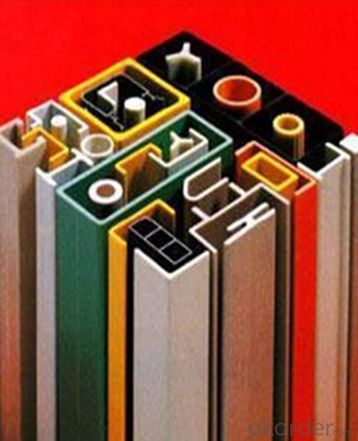
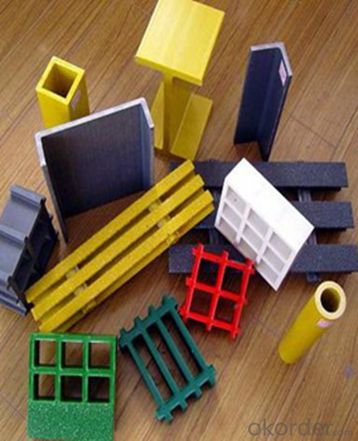
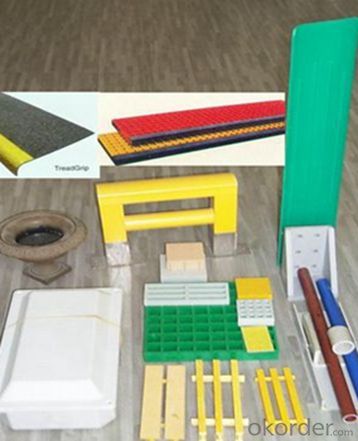
- Q: Can FRP pultrusion profiles be used in aerospace applications?
- Yes, FRP (Fiber Reinforced Plastic) pultrusion profiles can be used in aerospace applications. FRP materials have several advantages that make them suitable for aerospace use. Firstly, they have excellent strength-to-weight ratios, which is crucial in the aerospace industry to reduce weight and enhance fuel efficiency. Secondly, FRP materials exhibit high corrosion resistance, making them suitable for prolonged exposure to harsh environments, such as high altitude and extreme temperatures. Additionally, FRP pultrusion profiles offer design flexibility, allowing for complex shapes and geometries to be manufactured. This flexibility enables aerospace engineers to tailor the profiles to specific requirements and optimize performance. Furthermore, FRP materials have low thermal conductivity, which helps in insulation applications and reducing heat transfer. Lastly, FRP pultrusion profiles have demonstrated good fatigue resistance, which is essential for aerospace applications subjected to cyclic loading. Overall, these properties make FRP pultrusion profiles a viable choice for various aerospace components, including structural members, interior parts, and electrical enclosures.
- Q: Are FRP pultrusion profiles resistant to oil and grease?
- FRP (Fiber Reinforced Plastic) pultrusion profiles are generally known for their excellent resistance to oil and grease. The combination of fibers, typically glass or carbon, with a polymer resin matrix results in a material that is inherently resistant to many chemicals, including oil and grease. This resistance is attributed to the non-reactive nature of the polymer resin, which prevents the oil or grease from penetrating the material and causing damage. Additionally, the pultrusion manufacturing process used to produce FRP profiles further enhances their resistance to oil and grease. During the pultrusion process, the fibers are impregnated with the resin and then pulled through a heated die, where the resin is cured. This creates a strong, uniform material with a dense surface that is less porous and more resistant to chemical penetration. It is important to note that the specific resistance of FRP pultrusion profiles to oil and grease can vary depending on the type of resin used and the specific application conditions. In some cases, specialized resin formulations can be used to further enhance the oil and grease resistance of FRP profiles, ensuring suitability for even more demanding environments. Overall, FRP pultrusion profiles are generally considered to be highly resistant to oil and grease, making them an excellent choice for applications where exposure to these substances is expected. However, it is always recommended to consult with the manufacturer or supplier to ensure that the specific FRP profile being used is appropriate for the intended application and chemical exposure.
- Q: Are FRP pultrusion profiles resistant to earthquakes?
- FRP pultrusion profiles have inherent properties that make them resistant to earthquakes. The composite material used in these profiles offers high strength and stiffness, allowing them to withstand seismic forces and vibrations. Additionally, FRP is lightweight, which reduces the load on structures during an earthquake. However, it is important to note that the overall seismic resistance of a structure depends on various factors, including design, installation, and the specific application of the pultrusion profiles. Therefore, proper engineering and design considerations are crucial to ensure optimal earthquake resistance.
- Q: Can FRP pultrusion profiles be used in wastewater treatment facilities?
- Yes, FRP pultrusion profiles can be used in wastewater treatment facilities. FRP (Fiber Reinforced Plastic) pultrusion profiles are known for their high strength, corrosion resistance, and durability, making them suitable for various applications, including in harsh environments like wastewater treatment facilities. These profiles can be used for constructing structures, such as walkways, handrails, grating, and tanks, as well as for reinforcing or replacing traditional materials, such as steel or concrete, in different components of the facility. The corrosion resistance of FRP pultrusion profiles ensures their longevity and reduces maintenance costs, making them a viable option for wastewater treatment facilities.
- Q: What are the main uses of pultruded glass fiber reinforced plastic extrusions?
- Road transportation shopping malls, the successful use of: highway barrier fence on both sides, road signs, pedestrian overpass, noise barrier, refrigerated vehicle components.
- Q: Are FRP pultrusion profiles resistant to chemicals used in mining operations?
- Yes, FRP (Fiber Reinforced Polymer) pultrusion profiles are generally resistant to chemicals used in mining operations. FRP materials are known for their excellent chemical resistance properties, making them suitable for various corrosive environments, including mining operations. The resin matrix used in FRP pultrusion profiles can be selected to provide resistance against a wide range of chemicals commonly found in mining applications, such as acids, alkalis, solvents, and corrosive gases. Additionally, the reinforcement fibers, usually made of glass or carbon, further enhance the overall chemical resistance of the profile. Furthermore, FRP pultrusion profiles are non-conductive, which makes them an ideal choice for electrical and mining applications. They do not corrode or degrade under exposure to chemicals, ensuring durability and longevity in harsh mining environments. However, it is essential to consider the specific chemicals and concentrations used in mining operations. While FRP pultrusion profiles have excellent chemical resistance in general, prolonged exposure to extremely aggressive chemicals or high concentrations may require additional measures, such as selecting specific resin systems or surface coatings, to ensure optimal performance and longevity. It is advisable to consult with FRP manufacturers or experts to determine the best-suited materials for specific mining chemical environments.
- Q: FRP pultrusion process?
- Pultruded glass steel is mainly using unsaturated polyester resin, Yuezhanla extrusion molding process more than 90% in addition to the amount of resin, epoxy resin, vinyl resin, thermosetting resin, propionic acid modified phenolic resin, flame retardant resin etc..
- Q: Can FRP pultrusion profiles be used in pedestrian bridges?
- Yes, FRP pultrusion profiles can be used in pedestrian bridges. FRP pultrusion profiles offer a number of advantages that make them suitable for bridge construction, including their high strength-to-weight ratio, corrosion resistance, and durability. These profiles are made by pulling continuous fibers through a resin bath and then through a heated die, resulting in a strong and lightweight material. The lightweight nature of FRP pultrusion profiles makes them ideal for pedestrian bridges as they can be easily transported and installed. Additionally, their high strength allows them to withstand the load requirements of pedestrian traffic. These profiles also have excellent resistance to corrosion, which is especially important for bridges that are exposed to environmental elements such as rain, humidity, and saltwater. Furthermore, FRP pultrusion profiles are highly durable and require minimal maintenance compared to traditional construction materials like steel or concrete. They are not susceptible to rust or rot, and their non-conductive properties make them safe for use in areas with electrical infrastructure. In summary, FRP pultrusion profiles are a suitable choice for pedestrian bridges due to their lightweight, high strength, corrosion resistance, and durability. These profiles offer a cost-effective and long-lasting solution for bridge construction, ensuring the safety and convenience of pedestrians.
- Q: What are the limitations of using FRP pultrusion profiles?
- There are several limitations associated with using FRP (Fiber Reinforced Polymer) pultrusion profiles, which are worth considering when selecting materials for a particular application. 1. Limited design flexibility: FRP pultrusion profiles are manufactured through a continuous process, resulting in a fixed cross-sectional shape. This restricts the ability to create complex or custom profiles, limiting design flexibility compared to other materials like metals or plastics. 2. Vulnerability to UV degradation: FRP materials can be susceptible to degradation when exposed to ultraviolet (UV) radiation. Over time, prolonged exposure to sunlight can cause fading, discoloration, and loss of mechanical properties. Therefore, proper surface coatings or UV protection measures must be implemented to ensure long-term durability in outdoor applications. 3. Lower impact resistance: FRP pultrusion profiles generally have lower impact resistance compared to metals. While they offer excellent strength-to-weight ratios, they may be more prone to damage from impacts or heavy loads. Careful handling and structural reinforcement may be necessary to mitigate the risk of damage. 4. Thermal expansion and contraction: Like most polymers, FRP materials have a relatively high coefficient of thermal expansion compared to metals. This means that they will expand and contract more significantly with changes in temperature. This property must be accounted for in design calculations and proper allowances made to ensure dimensional stability and prevent issues such as buckling or warping. 5. Limited fire resistance: FRP pultrusion profiles are generally combustible and can contribute to the spread of fire. While some FRP materials can be formulated with fire-retardant additives, they may still not meet the stringent fire safety requirements of certain applications. In situations where fire resistance is critical, alternative materials with better fire resistance properties may be preferred. 6. Cost considerations: FRP pultrusion profiles, especially those with specialty reinforcements or additives, can be more expensive compared to traditional materials like steel or aluminum. While the initial material cost may be higher, it is important to consider the overall life cycle cost, including maintenance, durability, and weight savings, to determine the cost-effectiveness of FRP profiles for a specific application. It is essential to carefully evaluate these limitations and compare them against the specific requirements and constraints of the intended application to determine whether FRP pultrusion profiles are the most suitable materials to use.
- Q: Are FRP pultrusion profiles resistant to impact?
- Yes, FRP (Fiber Reinforced Polymer) pultrusion profiles are generally resistant to impact. The combination of the high-strength fibers and the polymer matrix used in the manufacturing process makes FRP profiles highly durable and able to withstand significant impacts without cracking or breaking. Additionally, the pultrusion process ensures that the fibers are uniformly distributed throughout the profile, further enhancing its impact resistance. This makes FRP pultrusion profiles ideal for applications where impact resistance is important, such as in construction, transportation, and infrastructure projects.
Send your message to us
FRP Pultrusion Profiles - Anti-Ageing FRP Pultruded Grating with Best Quality
- Loading Port:
- Tianjin
- Payment Terms:
- TT OR LC
- Min Order Qty:
- 4000 m.t.
- Supply Capability:
- 50000 m.t./month
OKorder Service Pledge
OKorder Financial Service
Similar products
Hot products
Hot Searches
Related keywords
